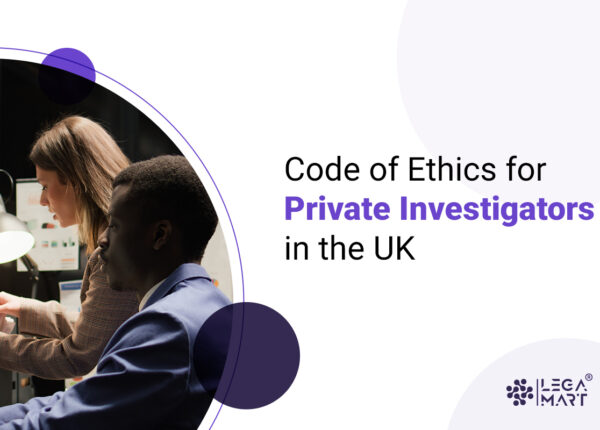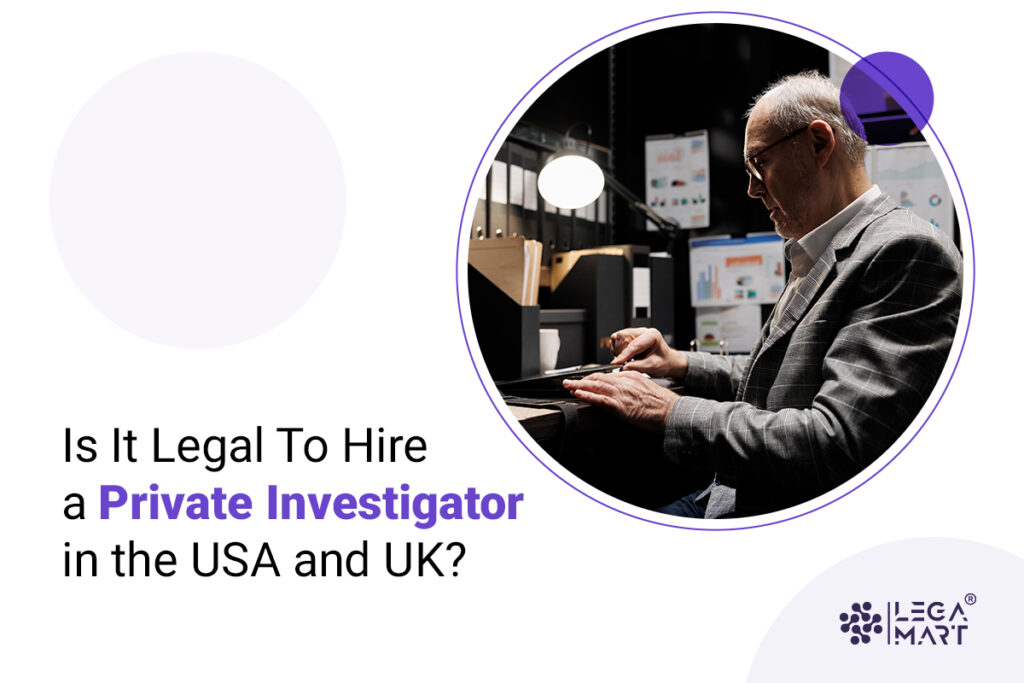In a world where information is power, the role of private investigators has become increasingly vital in legal proceedings, corporate matters, and personal inquiries. However, the legality of hiring a private investigator varies across jurisdictions, and understanding the nuances is crucial for individuals, businesses, and legal professionals. In this exploration of the legal landscape, we delve into the intricacies of hiring private investigators in the United States and the United Kingdom, shedding light on the permissible boundaries and ethical considerations that govern this profession.
In law, business, and personal affairs, accurate and timely information is paramount. Private investigators often play a pivotal role in their surveillance, research, and information-gathering skills. However, the line between legal and illegal activities can be thin, making it essential to navigate the legal landscape carefully.
The United States: A Tapestry of State Laws
While the profession is generally accepted and recognised, the specifics of licensing requirements and permissible activities form a complex mosaic in the United States. Delving into this legal tapestry becomes imperative for those seeking investigative services and the investigators themselves.
What are the Requirements for the License of Private Investigators?
Private investigators in the United States are subjected to a kaleidoscope of licensing requirements, a spectrum that varies from state to state. The criteria for licensure, entailing considerations such as education, experience, and background checks, lack a standardised approach. Individuals and businesses, therefore, bear the responsibility of meticulous verification, ensuring that the selected investigator possesses a valid license aligned with the nuanced regulations of the relevant jurisdiction.
The Massachusetts Licensure Dilemma
A notable instance highlighting the intricacies of state licensing requirements unfolded in Massachusetts. In 2019, a private investigator faced legal consequences for operating without a proper license, leading to a heightened scrutiny of licensing regulations in the state. This case serves as a stark reminder of the legal repercussions triggered by non-compliance with state-specific licensing mandates.
What are the permissible activities?
While private investigators wield authorisation for a spectrum of activities, including surveillance and information gathering, legal boundaries delineate the extent of their actions. Activities that infringe on privacy, such as invasion of personal space, trespassing, or unauthorised wiretapping, represent instances where investigators can unknowingly transgress legal limits. Rigorous adherence to ethical and legal standards becomes a professional virtue and a shield against potential legal consequences.
In the landmark case of Katz v. United States (1967), the Supreme Court ruled on protecting an individual’s privacy against unauthorised wiretapping. This decision set a precedent, establishing that the Fourth Amendment protects individuals from unwarranted intrusion, even in spaces where privacy might be assumed to be diminished. Private investigators must be acutely aware of such legal precedents to ensure compliance with the law.
In private investigations, the United Kingdom orchestrates a regulatory symphony, harmonising the legitimate needs of businesses and individuals with the imperative to safeguard privacy rights. Unlike the patchwork of state laws in the United States, the UK employs a more centralised approach through the Security Industry Authority (SIA), weaving a tapestry of licensing and ethical standards.
SIA Licensing
Private investigators traversing the landscapes of the United Kingdom are guided by the requirement to hold a coveted SIA license, a testament to the rigorous standards set forth by the regulatory authority. This licensing process unfurls as a stringent prelude, entailing exhaustive checks on an investigator’s criminal record, qualifications, and overall integrity. The meticulous scrutiny woven into the licensing framework aims to elevate professionalism within the industry, ensuring that only those with an unblemished record and the requisite expertise contribute to the symphony of private investigations.
Code of Ethics for Private Investigators in the UK

Beyond the formal licensing structure, private investigators in the UK have to adhere to a strict code of ethics. This harmonious guidepost underscores respect for privacy, unwavering integrity, and a commitment to lawful behaviour. Violations of this ethical score endanger the investigator’s license and carry the potential for legal consequences, adding a layer of accountability to the harmonious pursuit of truth.
The SIA License Revocation Case: In 2018, a private investigator in the UK faced the revocation of their SIA license due to breaches of the ethical code. The investigator, found guilty of intrusive surveillance and disregarding privacy rights, not only lost their license but also faced legal consequences for their actions. This case serves as a poignant reminder of the real-world implications of violating the ethical standards set by the SIA.
Ethical Considerations that need to be kept in mind:
While the legal frameworks provide a foundation, ethical considerations play a crucial role in the work of private investigators. Respecting the boundaries of privacy, obtaining information legally, and avoiding activities that infringe on individual rights are paramount. Dr. Sarah Turner, a renowned expert in legal ethics, emphasises that “private investigators must uphold the highest standards of ethical conduct to maintain the integrity of the profession.”
Respecting the Boundaries of Privacy
At the heart of ethical considerations lies a commitment to respecting the boundaries of privacy. Private investigators operate where the pursuit of information must coexist with an unwavering respect for individuals’ right to privacy. This involves a meticulous dance, ensuring that the quest for truth does not trample upon the personal spheres of those under investigation. Ethical investigators understand the delicate nature of this balance, using privacy as a moral compass in their pursuit of information.
Obtaining Information Through Legal Means
Ethical private investigators adhere to a fundamental principle – information should be obtained legally. While the legal frameworks provide a roadmap, ethical considerations elevate this requirement to a guiding code. Unlawful methods, such as hacking, unauthorised surveillance, or other invasive tactics, are ethically questionable and tarnish the entire profession’s reputation. Dr. Sarah Turner, a revered expert in legal ethics, underscores the importance of this ethical code, emphasising that maintaining the highest standards of conduct is imperative for the integrity of the investigative profession.
Avoiding Activities that Infringe on Individual Rights
Ethical considerations compel private investigators to avoid activities that infringe on individual rights. This encompasses avoiding actions that may cause harm, distress, or unjust scrutiny to the subjects of an investigation. Ethical investigators recognise the humanity of those involved, understanding that their actions, though aimed at revealing truths, should not lead to unwarranted consequences for the individuals under scrutiny. Dr. Turner’s emphasis on upholding the highest ethical standards resonates in this context, as she highlights the moral imperative of safeguarding individual rights throughout the investigative process.
The Ethics-Centric Investigation: In a notable case from 2019, a private investigator faced ethical dilemmas during an insurance fraud investigation. Instead of resorting to questionable tactics, the investigator adhered strictly to legal and ethical standards. This ensured the case’s integrity and garnered public trust, highlighting the tangible impact of ethical considerations on the profession’s reputation.
Privacy Concerns
A crucial facet of legal challenges in private investigations revolves around privacy concerns. Landmark decisions often hinge on the delicate balance between uncovering the truth and respecting the right to privacy. A notable case in 2018, where evidence obtained by a private investigator through questionable surveillance methods was deemed inadmissible, underscored the courts’ commitment to upholding privacy rights. This decision became pivotal in defining the ethical boundaries private investigators must operate.
Admissibility of Evidence
Landmark decisions play a pivotal role in shaping the admissibility of evidence gathered by private investigators. Courts scrutinise the methods employed, emphasising the importance of legality and ethical considerations. A landmark case in 2020 set a precedent by excluding evidence obtained through unauthorised access to digital communications. This decision highlighted the legal ramifications of overstepping ethical boundaries and underscored the need for investigators to operate within the confines of the law.
Cross-Border Investigations
In an era of globalisation, private investigations often transcend national boundaries, requiring a nuanced understanding of international legalities. The complexities of conducting investigations in multiple jurisdictions demand collaboration between investigators and legal experts from different countries to navigate the intricate web of international laws.
Collaboration and Legal Expertise
The success of cross-border investigations hinges on collaboration and legal expertise. Private investigators must work hand-in-hand with legal professionals well-versed in the laws of the countries involved. A case in 2019 exemplifies the significance of such collaboration, where an international investigation into financial fraud required seamless coordination between investigators and legal experts from three different jurisdictions. The outcome unveiled a complex web of fraudulent activities and highlighted the critical role of legal collaboration in ensuring the investigation’s legal integrity.
Technology, Regulation, and the Privacy Balancing Act
As technology continues its relentless march forward, the landscape for private investigators evolves in tandem. Incorporating surveillance technology, data analytics, and artificial intelligence introduces new considerations that legal experts predict will shape future regulations. Striking a delicate balance between investigative needs and individual privacy becomes a focal point for legal developments.
Technological Advancements
The advent of sophisticated surveillance technology, data analytics tools, and artificial intelligence heralds a new era for private investigators. However, with great technological power comes the responsibility to navigate the legal ramifications. A case in 2021, where facial recognition technology in an investigation faced legal scrutiny, exemplifies the challenges posed by technological advancements. Legal experts anticipate that future regulations will need to adapt swiftly to address the legal implications of emerging technologies in private investigations.
Privacy in the Technological Age
Legal experts unanimously emphasise the need for future regulations to strike a delicate balance between harnessing technological capabilities for investigative purposes and safeguarding individual privacy. A landmark decision in 2022, acknowledging the right to privacy in the context of data analytics in private investigations, laid the groundwork for anticipated legal adjustments. This decision underscored the importance of adapting legal frameworks to the evolving technological landscape while upholding the fundamental right to privacy.
In the pursuit of truth and information, the legalities surrounding hiring private investigators are complex but navigable. Understanding the specific laws in the jurisdiction of operation, upholding ethical standards, and staying abreast of legal developments are essential for both clients and investigators. In a world where information is power, the key is to unveil the truth within the bounds of the law.
Conclusion
In the ever-evolving landscape of private investigations, where legal complexities intertwine with ethical considerations, the need for a comprehensive understanding of the profession is more crucial than ever. As individuals, businesses, and legal professionals grapple with the challenges posed by the dynamic nature of investigative work, a platform like LegaMart stands as a beacon of support.
As we navigate the intricate tapestry of laws, ethical considerations, and technological advancements shaping the future of private investigations, LegaMart becomes not just a choice but a strategic decision. Explore the possibilities, harness the power of legal expertise, and embark on a journey towards informed, ethical, and legally sound investigative solutions. Your quest for reliable, professional, innovative private investigation services begins at LegaMart. Visit today and unlock a world where legal acumen meets cutting-edge solutions.




